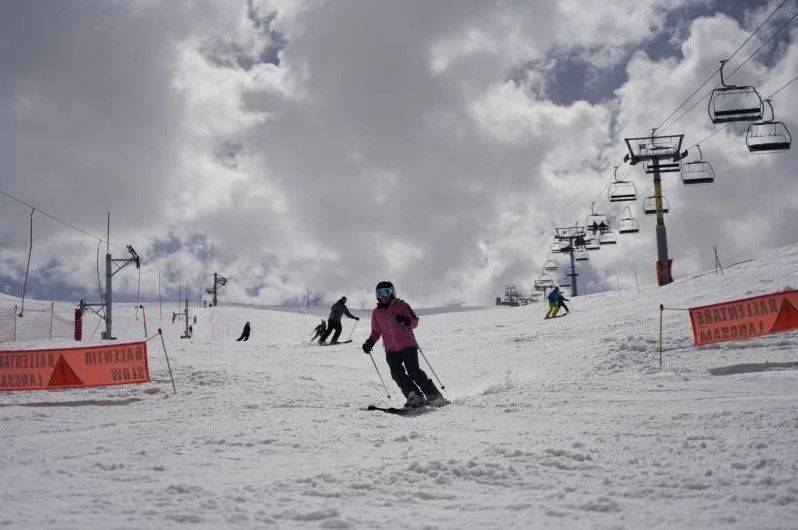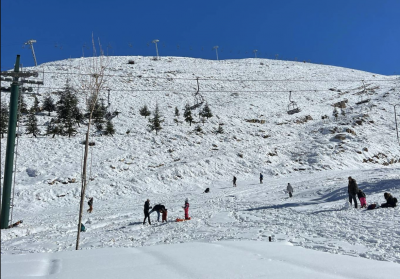
Caretaker Minister of Tourism Walid Nassar assures that more than 700,000 people visited Lebanon during the first two months of the year. (Credit: Mohamad Yassin/L'Orient Today)
Ski resort managers are disappointed. While they opened for a season that lasted between the end of December and late January over the last five years, the relatively short and mild winter of 2023 forced them to delay the opening of ski slopes to Feb. 10 in all ski areas.
“We missed seven weeks of opening time,” said Johnny Keyrouz, co-owner of the Cedars ski resort.
Especially frustrating is that the snow fell in abundance in a short period of time and has already begun to melt due to the early rise in temperatures over the past ten days. Faced with this reality, ski resorts have redoubled their efforts to attract as many customers as possible and make the most out of the short season.
Some resorts, like the Zaarour Club station located on the heights of Metn, have not even had the time to use their snow cannons, which usually give resorts the benefit of a few extra operating days.
Caretaker Tourism Minister Walid Nassar made it a point to encourage visitors of all nationalities to consider visiting the Lebanese slopes in a marketing campaign entitled, Lebanon Snow Festival, which was organized in partnership with Middle East Airlines.
Speaking to L’Orient-Le Jour, Nassar said that this campaign played a role in the 69 percent increase in the number of tourists that visited Lebanon between January and February 2023, compared to the same period in 2022.
He added that the number of tourists coming from other countries and Lebanese expatriates who came to Lebanon during the first two months of 2023 “exceeded 700,000” and generated “nearly $1.5 billion.” Of these visitors, 75 percent were Lebanese expatriates, while the remaining 25 percent were international visitors, the majority of which from Arab countries, including Iraq, Egypt and Jordan.
‘We did not feel the crisis on the slopes’
Despite the short season, skiers did not deny themselves the pleasure of answering the snow’s call. Ski resort managers were pleasantly surprised with the numbers of people that showed up on the slopes this week.
Nour Saab, general manager of Laqlouq Village Vacance, said she was satisfied with the numbers.
“The season started late, but it coincided with the school break, which explains the high attendance on the weekdays. Parents and children were able to ski down the slopes together. We did not feel the crisis on the slopes,” she said.
It remains that since the economic crisis began, snow activities in Lebanon have not become cheaper. While some ski resorts have tried to keep their pre-crisis prices, others have taken to increasing their rates.
The Cedars ski resort has kept its prices the same. An adult full-day ticket, without rental equipment, f has been sold for the rate of $30 dollars during the week and $40 during the weekend since 2020
At the Domaine du Soleil in Mzaar, a full-day pass without equipment for adults on the weekends has remained at $50 since 2019, but full-day passes on the weekdays increased from $27 in 2020 to $30 in 2023.
In Zaarour and Laqlouq, tickets for adults without equipment rental on weekdays increased from $10 to $25 and from $17 to $22 respectively, between 2020 and 2023. Full- day tickets for adults on the weekends (also without equipment rental) rose from $18 in 2020 to $40 in 2023 in Zaarour and from $23 to $30 in Laqlouq.
Carole al-Murr, CEO of Zaarour Club, pointed out that prices in 2023 are still lower than in 2019. When the dollar rate was still at LL1,507.5, a full-day price for adults on weekdays was at LL40,000, the equivalent of $26.5, and LL65,000 on weekends, or about $43. However, this does not apply to all ski areas. Murr attributed the higher rates between 2020 and 2023 to the lifting of fuel subsidies in 2022.
“All of our mechanical infrastructure, such as the ski lifts, are powered by fuel oil. If it was cheap just before the season started thanks to government subsidies, it has become much more expensive since they were lifted,” said Murr.
It is also difficult for the resorts to rely on the state-owned provider, Electricité du Liban (EDL), which has been supplying only four hours of electricity a day since the beginning of February.
“Some restaurants and chalets are connected to EDL’s electricity network and benefit from it. But the ski resorts can’t really rely on it, because the electricity is not that stable and might not be enough to run the chairlifts properly,” she added.
Unequal in the face of climate change
In Lebanon, ski resorts are at the confluence of both the economic crisis and the climate crisis. In a bid to cope with the situation, some resorts decided to diversify their activities to remain open all year round.
Betting on the beauty of landscapes and cool temperatures during hotter months, mountain tourism is on the rise. The Zaarour area, with the support of significant investments by Zaarour Club, has become known for this. The station built a hotel equipped with an outdoor swimming pool and an artificial lake where visitors can take boat rides. Other facilities were also built so that the resort can host parties, featuring artists and DJs. The dual summer-winter role of the Zaarour resort, allows it to counterbalance the effects of shorter ski seasons.
On another summit in North Lebanon, the Cedars resort sits at an altitude of between 2,000 and 2,600 meters above sea level, near the Qadisha Valley. Although the area of the Cedars is classified as a natural site protected by the United Nations Educational, Scientific and Cultural Organization (UNESCO), it struggles to attract as many people once the snow melts.
“We tried to open during the summer, but it didn’t work,” said Johnny Keyrouz.
It is particularly far from Beirut, unlike other ski areas and the area suffers from scarce tourist infrastructure, despite its major potential.
“There is a need for the whole area to be part of a project aiming to attract tourists wishing to go hiking, for instance, so that the resort continues to endure during the summer,” said Johnny Keyrouz.
A project to help develop the area was launched in 2020, entitled “Sustainable Qadisha.” Financed primarily by French organizations, the objective of this project was to develop different sectors of that area, such as agriculture and tourism while preserving the natural beauty of the site.
Nathalie Keyrouz, who is in charge of various cooperation projects in Qadisha, would like to see this protected area equipped with a tourist circuit to manage summer sports activities, such as hiking and electric bike rides. This could help the Cedars resort make its services ever-green, for the benefit of tourists, who come to Qadisha for a breath of fresh air.
This article was originally published in French in L'Orient-Le Jour. Translation by Joelle El Khoury.
